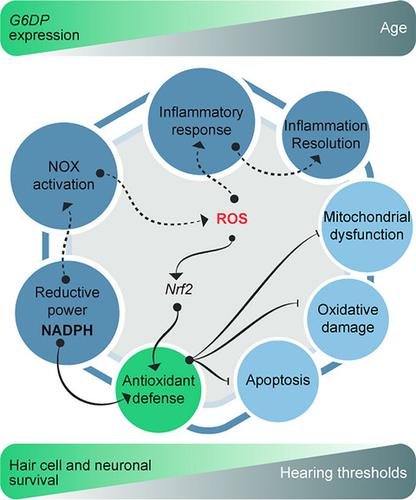当前位置:
X-MOL 学术
›
Aging Cell
›
论文详情
Our official English website, www.x-mol.net, welcomes your
feedback! (Note: you will need to create a separate account there.)
G6PD overexpression protects from oxidative stress and age‐related hearing loss
Aging Cell ( IF 8.0 ) Pub Date : 2020-11-22 , DOI: 10.1111/acel.13275 Jose M Bermúdez-Muñoz 1, 2 , Adelaida M Celaya 1, 2 , Sara Hijazo-Pechero 1 , Jing Wang 3 , Manuel Serrano 4 , Isabel Varela-Nieto 1, 2, 5
Aging Cell ( IF 8.0 ) Pub Date : 2020-11-22 , DOI: 10.1111/acel.13275 Jose M Bermúdez-Muñoz 1, 2 , Adelaida M Celaya 1, 2 , Sara Hijazo-Pechero 1 , Jing Wang 3 , Manuel Serrano 4 , Isabel Varela-Nieto 1, 2, 5
Affiliation

|
Aging of the auditory system is associated with the incremental production of reactive oxygen species (ROS) and the accumulation of oxidative damage in macromolecules, which contributes to cellular malfunction, compromises cell viability, and, ultimately, leads to functional decline. Cellular detoxification relies in part on the production of NADPH, which is an important cofactor for major cellular antioxidant systems. NADPH is produced principally by the housekeeping enzyme glucose‐6‐phosphate dehydrogenase (G6PD), which catalyzes the rate‐limiting step in the pentose phosphate pathway. We show here that G6PD transgenic mice (G6PD‐Tg), which show enhanced constitutive G6PD activity and NADPH production along life, have lower auditory thresholds than wild‐type mice during aging, together with preserved inner hair cell (IHC) and outer hair cell (OHC), OHC innervation, and a conserved number of synapses per IHC. Gene expression of antioxidant enzymes was higher in 3‐month‐old G6PD‐Tg mice than in wild‐type counterparts, whereas the levels of pro‐apoptotic proteins were lower. Consequently, nitration of proteins, mitochondrial damage, and TUNEL+ apoptotic cells were all lower in 9‐month‐old G6PD‐Tg than in wild‐type counterparts. Unexpectedly, G6PD overexpression triggered low‐grade inflammation that was effectively resolved in young mice, as shown by the absence of cochlear cellular damage and macrophage infiltration. Our results lead us to propose that NADPH overproduction from an early stage is an efficient mechanism to maintain the balance between the production of ROS and cellular detoxification power along aging and thus prevents hearing loss progression.
中文翻译:

G6PD 过表达可防止氧化应激和与年龄相关的听力损失
听觉系统的老化与活性氧 (ROS) 的增加产生和大分子氧化损伤的积累有关,这会导致细胞功能障碍,损害细胞活力,并最终导致功能下降。细胞解毒部分依赖于 NADPH 的产生,NADPH 是主要细胞抗氧化系统的重要辅助因子。NADPH 主要由管家酶葡萄糖-6-磷酸脱氢酶 (G6PD) 产生,该酶催化磷酸戊糖途径中的限速步骤。我们在这里展示了 G6PD 转基因小鼠 ( G6PD‐Tg),在生命过程中表现出增强的组成型 G6PD 活性和 NADPH 产生,在衰老过程中具有比野生型小鼠更低的听觉阈值,同时保留了内毛细胞 (IHC) 和外毛细胞 (OHC)、OHC 神经支配和每个 IHC 的保守突触数。3 个月大的G6PD - Tg 小鼠的抗氧化酶基因表达高于野生型小鼠,而促凋亡蛋白的水平较低。因此,蛋白质硝化、线粒体损伤和 TUNEL +凋亡细胞在 9 个月大的G6PD - Tg 中都低于野生型对应物。没想到,G6PD如没有耳蜗细胞损伤和巨噬细胞浸润所示,过表达引发了低度炎症,这在年轻小鼠中得到了有效解决。我们的研究结果使我们提出,早期的 NADPH 过量产生是一种有效的机制,可以在衰老过程中保持 ROS 的产生和细胞解毒能力之间的平衡,从而防止听力损失的进展。
更新日期:2020-12-17
中文翻译:

G6PD 过表达可防止氧化应激和与年龄相关的听力损失
听觉系统的老化与活性氧 (ROS) 的增加产生和大分子氧化损伤的积累有关,这会导致细胞功能障碍,损害细胞活力,并最终导致功能下降。细胞解毒部分依赖于 NADPH 的产生,NADPH 是主要细胞抗氧化系统的重要辅助因子。NADPH 主要由管家酶葡萄糖-6-磷酸脱氢酶 (G6PD) 产生,该酶催化磷酸戊糖途径中的限速步骤。我们在这里展示了 G6PD 转基因小鼠 ( G6PD‐Tg),在生命过程中表现出增强的组成型 G6PD 活性和 NADPH 产生,在衰老过程中具有比野生型小鼠更低的听觉阈值,同时保留了内毛细胞 (IHC) 和外毛细胞 (OHC)、OHC 神经支配和每个 IHC 的保守突触数。3 个月大的G6PD - Tg 小鼠的抗氧化酶基因表达高于野生型小鼠,而促凋亡蛋白的水平较低。因此,蛋白质硝化、线粒体损伤和 TUNEL +凋亡细胞在 9 个月大的G6PD - Tg 中都低于野生型对应物。没想到,G6PD如没有耳蜗细胞损伤和巨噬细胞浸润所示,过表达引发了低度炎症,这在年轻小鼠中得到了有效解决。我们的研究结果使我们提出,早期的 NADPH 过量产生是一种有效的机制,可以在衰老过程中保持 ROS 的产生和细胞解毒能力之间的平衡,从而防止听力损失的进展。











































 京公网安备 11010802027423号
京公网安备 11010802027423号